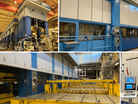Saab: Giving Manufacturing Machinery a Second Life

Manufacturers around the world are being forced to adapt to sustainable changes, adopting new technologies that are more climate-friendly.
Car manufacturers in particular are being hit by regulations aiming to phase-out internal combustion engine vehicles.
From Norway to Thailand, countries around the world are aiming to support new vehicles that produce zero tailpipe emissions.
This has led to the closure of Saab’s factory in Trollhättan, Sweden – the end of an era for Swedish automotive manufacturing.
Joachim Ågren, Country Manager for Sweden at Surplex, told Carup: “It’s difficult not to get nostalgic and shed a tear. These presses have shaped Saabs that millions of Swedes have grown up with.”
What happens to machinery left at the plant?
Industrial auction house Surplex is liquidating presses and machines from the Trollhättan facility so that they can have a second life.
“It’s astonishing to see the condition these machines are still in,” Joachim told Carup.
“The oldest press, from 1967, is fully modernised and still capable of handling today’s industrial demands.
“Most of these machines can be repurposed for different industries. The possibilities are only limited by imagination.”
Pressing machines are vital in car production, helping to mould various parts into shape.
The history of Saab’s Trollhättan factory
The factory has been producing cars since 1947 including Saab’s 14 main models in addition to special versions.
Peter Bäckström, Curator at the Saab Car Museum, told Carup: “These machines shaped everything from the Saab 96 and 99 to the last 9-5.”
In 2011, NEVS took over the factory to produce electric vehicles alongside Saab cars.
Despite various efforts to produce the two types of vehicle in tandem, it was not possible to carry out comprehensive series production of an electric car in these facilities.
The factory closed its doors in 2023.
What's next for Saab?
Now operating as purely a defence and security company, Saab has gone back to its roots of 'safeguarding Sweden's freedom'.
"Saab’s mission from the very beginning has been to keep people and society safe. The expectations from our customers and society have never been greater than they are now," says Marcus Wallenberg, Chairman at Saab.
The company is harnessing new technologies to ensure its business will be sustainable and drive future growth.
Micael Johansson, President and CEO at Saab, says: "The emergence of disruptive technologies such as AI and autonomy is set to be a gamechanger for our industry and reshape defence and security applications in the future.
"As we look ahead, we are investing in upskilling through our learning platform and putting efforts into both onboarding and our people experience.
"All our efforts within sustainability, innovation and people will be key to our long term success and value creation."
Make sure you check out the latest industry news and insights at ClimateTech Digital and be part of the conversation at our global conference series, Sustainability LIVE.
Discover all our upcoming events and secure your tickets today. Subscribe to the ClimateTech Digital newsletter.
ClimateTech Digital is a BizClik brand

